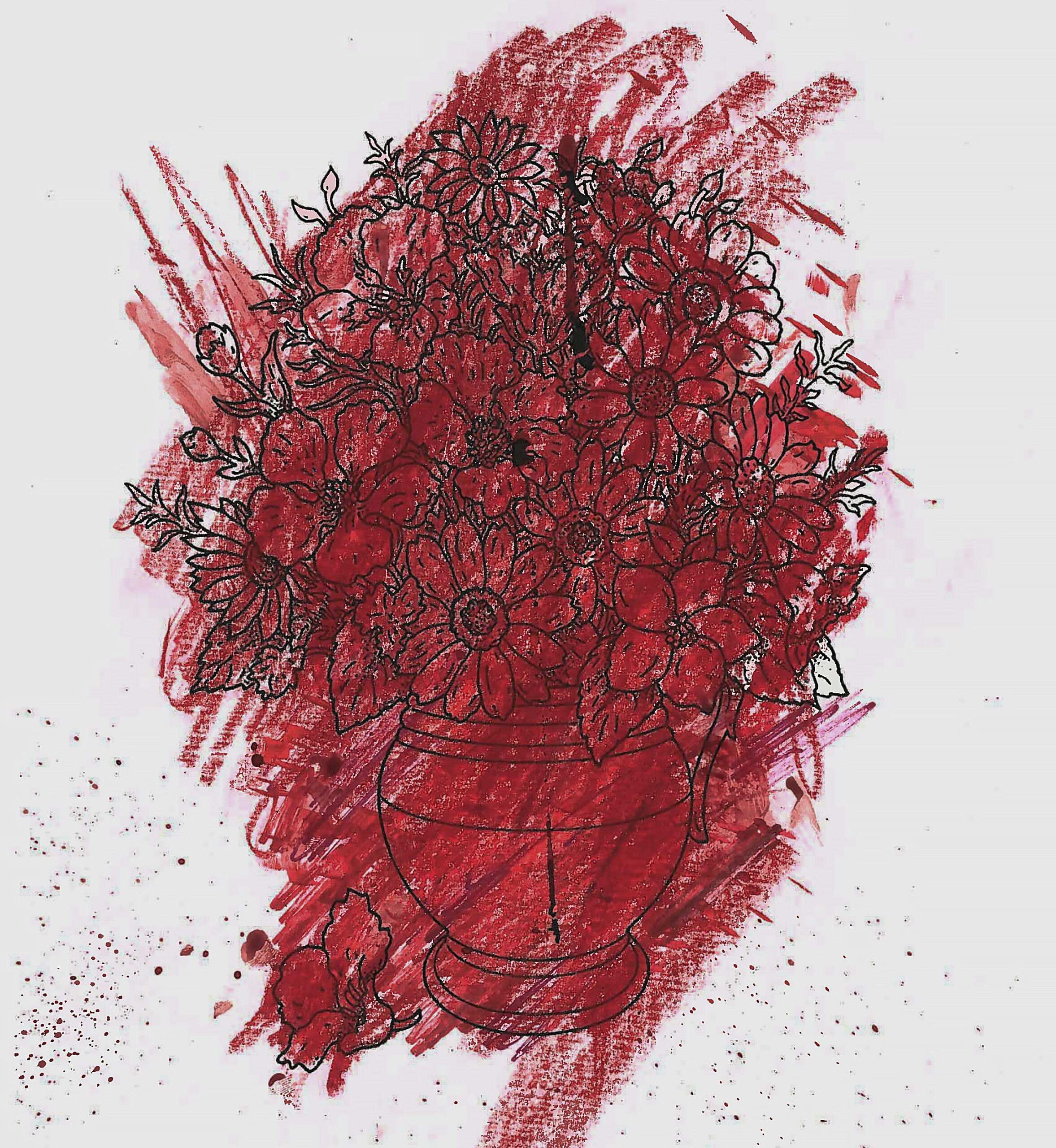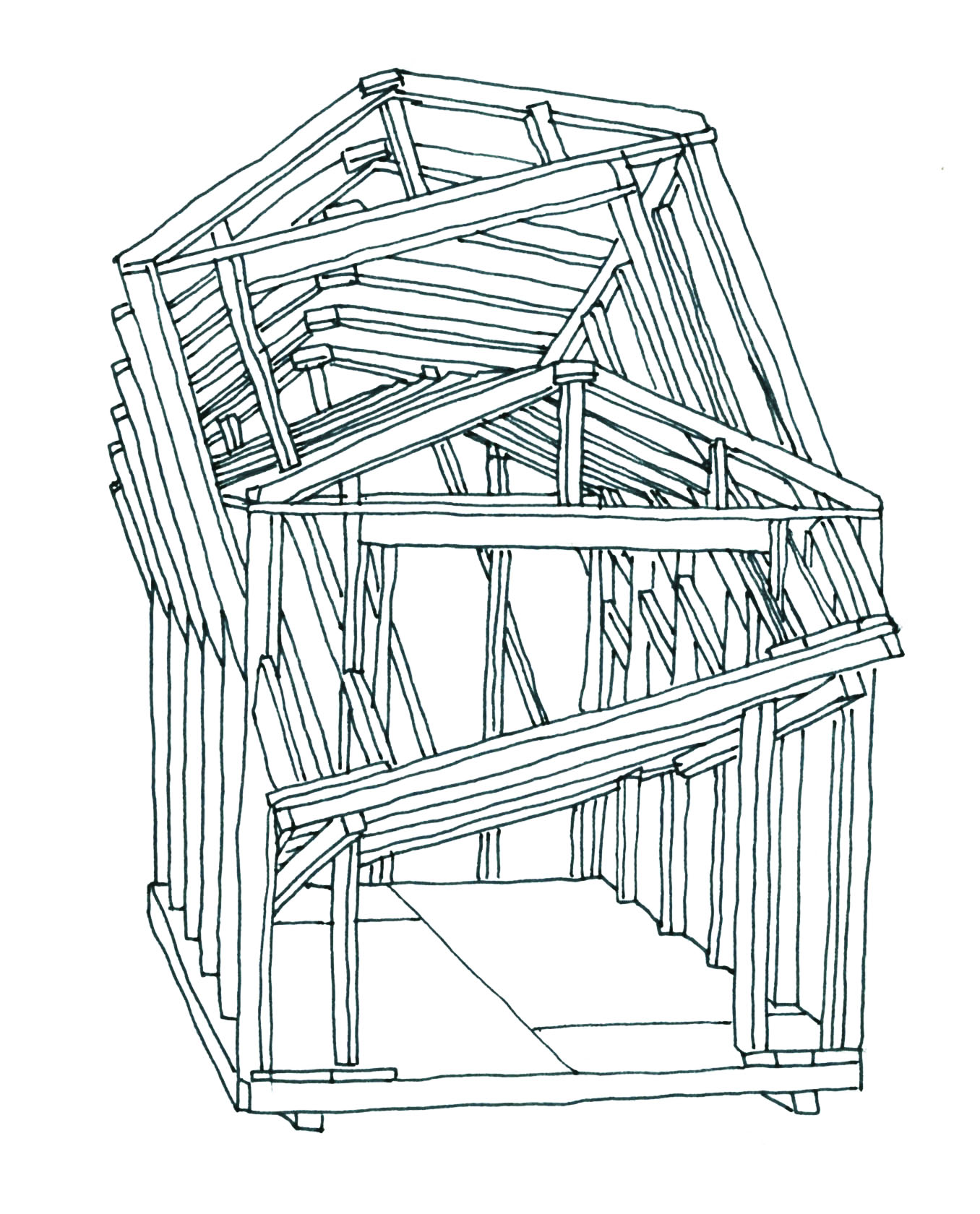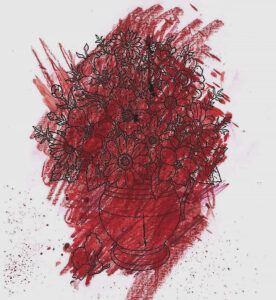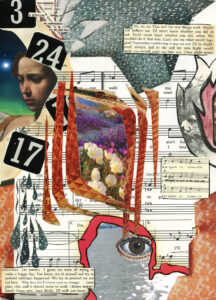Therapy Animals and Other Performers
Katie DePasquale
Once upon a time, my grandmother was named Queen of Outer Space, and everyone loved her. This was when her job was to be a math genius at the Jet Propulsion Labs in California in the ‘60s, before she turned into the cantankerous harpy she is today, perched on the couch like, what the hell, Claire, where are the tea biscuits? Here I am, just trying to mix us drinks and get ready for work, and she’s got to ask me for something she could get herself. Her gin fizz spitting in my hand, I waddle over in the bottom half of my minion costume, taking the long way around the room to avoid the kangaroo.
“Claire,” says the Queen, as always, “you are too good for this job.” This is a common refrain, no matter what the job is. But I guess you can’t really blame her: I have yet to even be a princess. Meanwhile, her beauty queen bona fides are on display atop her one bookcase in a black-and-white of a thin, pretty blonde in white satin and a royal cape. The weirdness of your job forcing you to be part of a pageant notwithstanding, she was glam enough, and smart and personable enough, to deserve that crown. Or so I’ve been told.
“Grandmother,” I say, setting down her glass and a sleeve of cookies. “I got you some new tea biscuits. They’re called Chips Ahoy.” She harrumphs, and the kangaroo snorts in solidarity. Maybe he’s glad that here he only has to meet the needs of one old person rather than thirty-six.
“I just don’t understand why you’re doing this,” the Queen says again. “You have a perfectly good job. They pay you perfectly good money. Why are you wasting your time playing dress up?”
I choke on the lime rind from my gin and tonic. “Boredom, dear Grandmother. Boredom and a need for human connection and a desire to experience the real Las Vegas during my time here.”
Her side-eye, despite the waning effectiveness of her vision, is still the best there is. “Hmmm,” she mutters at me. She turns off the TV and moves, in a series of steady but shuffling steps, to the table on her tiny balcony with her glasses, a Sudoku book, and a pen, leaving me alone in the air-conditioned hum to finish my drink, gather up the remaining pieces of my costume, and head for the car.
“Don’t let Norman stab you while I’m gone!” I call to her, glaring at the kangaroo from the front door. He doesn’t blink.
“Don’t be ridiculous!” she yells back.
“I’m not!” Do kangaroos attack people was the first thing I googled when she and Barry brought Norman home after kidnapping him from the nursing home where Barry’s wife lives. Preliminary search results indicated that such a young kangaroo as Norman, even a red, couldn’t kill a grown human and should know better than to try. An adult red, however, can disembowel a man with a well-placed kick and a single long toenail, which is vying for most unpalatable thing I’ve ever read. And I’m concerned that Norman might be advanced for his age. He’s been with us less than 24 hours, and any time he isn’t sleeping, he’s staring at me with heavily lidded, whiskered eyes like wet marbles, flipping his ears backward and forward and tilting his head from side to side. My estimate is about six hours of kangaroo surveillance. I refuse to corroborate this, but I suspect that he’s spent the most recent few hours filling up his awkwardly fitted diaper because the living room stinks. Hopefully he’s not leaking anywhere; Barry was not adept at fitting the diaper around his tail.
Here in Vegas, the fall sky usually looks like cotton candy at sunset, and I just can’t get used to it, all those thin-spun clouds fluffing along in the vastness of pink, baby blue, and orange. Every day is a gorgeous phantasmagoria, even when you’re stuck on the Strip trying to get tips from people who’d rather stand with the mostly naked performers and pretend these plastic doll men and women chose to pose with them free. Who wants to be next to the tubby yellow minion? Even most of the kids want to pose with the gladiator and the showgirl.
My night is particularly uneventful and low on cash, and Lila, my high school friend who introduced me to performing in the first place, is nowhere to be found. Because somehow, despite having birthed a kid and endured a nasty divorce, she still looks exactly like she did fifteen years ago, on the Strip she wears a feathered headdress, a waxy red smile, and little else, so she’s usually easy to locate because you can follow the salivating masses right to her Lucite-heeled feet. But in our patch of sidewalk tonight, there are no showgirls except her mortal enemies, the Tanzarian “twins,” who look alike only if you consider every blonde woman of the same general size to be interchangeable. This criterion apparently works for most tourists.
I give up on my glamorous double life around 11:30, when a thin slick of slime separates me from my costume. The small amount of entertainment I get by talking to people and watching them move through the casinos and their vacations isn’t quite the thrill it was three weeks ago when I started doing this on Lila’s drunken dare. But the thought of sitting in the Queen’s one-bedroom with her all night, in addition to all day, staring at the walls and each other, only saying things that bore her or that she feels the need to contradict, makes continuing to perform seem appealing. And Lila’s just as loopy and goofy as when we were in Catholic school together in Jersey, so it’s fun to hang whenever I can convince her to take a break. Of course, we could spend time catching up over coffee with much less of a chance of someone’s kid puking up Wahlburgers on my feet after calling me fat and smelly. But she has no time for that; whenever she’s not working, she’s with her kid.
By the time I get back to my grandmother’s, it’s midnight, and she’s snoring away in her room, flat on her back with her eye mask on, her head perfectly centered on the silk pillowcase she uses to reduce wear and tear on the skin. Norman is sleeping on a couch cushion she’s placed on the floor in the corner of the kitchen. He’s resting on his side in a guy’s casual model pose, but still tethered carefully to the doorknob of the pantry with a leash. This arrangement looks highly suspect, but who knows, maybe this is how everyone sleeps at the Gables. I’ve heard stranger and far more depressing tales about nursing homes.
After stuffing my sad earnings of $70 into the bottom corner of my suitcase, I step onto the balcony for a cigarette. Being Care Bear Claire, a part of my extended family’s high-wire act as the emotional support Cirque du Soleil, requires the temporary resurrection of at least one old, bad habit, and this is the one I picked. At first, it seemed like taking FMLA to be with the Queen, who doesn’t have much in the way of constant daily needs but does have many “requests,” wasn’t worth it for me personally and should fall to my retired father or one of his cousins. But then one more doctor made a dirty joke when I gave him his free Viagra pen, and I had such an overwhelming urge to stab him in the eyeball with it that I figured, why not take a break from my “real life” in big pharma? Once I arrived, I discovered the Queen had been ignoring her eyesight issues, meaning her needs are slightly more pronounced than she’d been letting on. Still, stealing a therapy animal is a huge departure from her norm. The woman I’ve always known despises both dishonesty and shortcuts.
I text Lila because no one else will appreciate getting a complaint about a kangaroo at 12:30 a.m. I include a picture of sprawled-out Norman, and she texts back immediately, joking that he looks like a ‘70s male centerfold—“Soooo hairy LOL!”—and asking why he’s still there before sending a flurry of texts about the cute guy who usually plays Captain America near us and complaining about her son’s terrible cold that he can’t seem to kick. I don’t have much to say on these subjects. My knowledge of five-year-olds and their ability to fight off viruses is nonexistent, and I’ve got no insight into men, either. But it turns out, like everyone else I know, Lila frequently want to discuss one or the other. I stub out my cigarette on the wall and go back to the AC.
Far earlier than I’m interested in being conscious, my grandmother shakes my shoulder, hands me a “World’s Best –andmother” mug, and asks me to go grocery shopping. Not for her, but for Norman. It’s a bad sign for my day that I can’t even enjoy my coffee in this terrible sofa bed without being encouraged to do something useful.
“Why didn’t you guys steal him more food? What does he eat, anyway?” I ask.
“You can get him some fruit, I suppose, and maybe some lettuce. Yesterday night he ate all the lettuce I had.” She looks proud and irritated. Ignoring my exhaustion, I agree to go so that she won’t try to drive. I inch myself carefully out of the far side of the sofa and hurry around the room the long way so that I don’t have to get too close to Norman, who’s hopping around in a leisurely fashion and focusing those glistening eyes on me. It doesn’t occur to me until I’m completely grumpy and halfway to the Whole Foods that I have one reinforcement: my dad. He answers on the fourth ring to tell me he’s on a tight schedule, which means the ice in his drink is melting.
“Your mother got a kangaroo,” I say. I hear him slurping before he responds, “What?”
“A kangaroo, a baby kangaroo, that she and her friend Barry stole from an old folks’ home where it was the therapy animal or something. And who exactly is Barry, anyway?” I almost miss my turn and have to wrench the steering wheel to the right to make it into the parking lot. An old lady who, at a quick glance, resembles the Queen flips me off from the front seat of her Beamer as I park.
“Barry?” My dad sounds confused. “I don’t know any Barry, but she doesn’t really talk about her friends much to me. I don’t understand. They got a kangaroo? A real one?”
“Yes. How am I going to convince her to get rid of it?”
“Well, you know your grandmother.” He stops, and I distinctly hear the clinking of ice, the gentle glug of more swallowing.
“What?”
“I said…”
“I heard what you said. It’s just not helpful at all.” Isn’t insanity doing the same thing repeatedly and expecting a different result? He’s lovely, lovable, and completely incapable of confronting any situation that he can sidestep.
“Well, sweetie, you know I’ve never been able to change what your grandmother wants to do. It’s just so much easier when she’s in charge.”
I picture him, as he says this, leaning on his wooden balcony railing, looking out over the verdant vistas of countryside Vermont from his rustic little hillside apartment, reflecting longingly on the days when his mother organized and arranged everything in his life for him, when she was at the top of her game and he didn’t have to plan anything because she was the clever one who worked and cooked and laid out his outfits and sorted it all. My mother, on the other hand, often suggested that he take some initiative, which he resisted with the concerted focus of the truly lazy, unless he deemed the fallout too unpleasant to ignore. Now, his days unscroll smoothly into hours of eating, drinking, smoking, and hanging out with the few buddies he’s made since retiring and moving after my mom died ten years ago.
“Please start the conversation,” I say as I rush down the produce aisle, looking for the biggest bag of greens, “but casually, so she can’t say we’re ganging up on her. Then I’ll convince her to call Animal Control or something. You’re her son, she’ll listen to you!”
“Oh, I don’t know,” he’s saying vaguely into the phone, rattling his drink again, as I hang up. But I do: as her baby, the only man she’s always had a kind word for, he has the odds in his favor more than most. She’ll register that he has a point, even if she disagrees with it. Or so I tell myself as I go through the checkout with four bags of varied greens and a few apples, trying to believe he’ll follow through and make the Queen listen to reason so I don’t have to live here forever. If it’s this hot in the fall, I’ll definitely melt in the summer.
“Juice cleanse, right?” chirps the girl behind the register, a perky red-headed cheerleader type with a silver star nose ring.
“Ew, no. I’ve got to feed a kangaroo.” I stare her down, and she stares back while she contemplates whether I’m lying.
“Did you hear about that woman in Wisconsin who took her kangaroo to McDonalds?” she says at last, deadpan. “Maybe yours would rather have a burger.” The bagger, an empirically good-looking chiseled guy who could and possibly does pose as a gladiator on the Strip, watches his arm flex as he hands me my groceries and says in a serious tone, “I’m pretty sure they’re vegetarians, Jess.” She rolls her eyes at me behind his back, and I hear her saying, “Of course they are, Keith,” as I rush out into the sun-blasted heat. The old woman who gave me the finger is glaring at the world as she and her walker inch towards the automatic door.
When I get back to the condo, Barry’s putting in his daily appearance, and he and the Queen are wearing pastels and roasting themselves on the balcony, as if they need another layer on their tans. Norman could be with them, but it’s hard to tell because he’s shorter than the balcony’s stucco wall.
“I have food!” I call as I let myself in, peering around the edge of the front door in case Norman’s waiting to eviscerate me. Instead, the aroma of sweaty, dirty animal fills my nose. I should have bought diapers. Also, I hope we can get rid of him before he requires a bath.
“We’re outside,” the Queen trills. I find her rubbing Norman’s head between his ears. He’s barely moving, so he’s either very content or paralyzed by fear. Barry, meanwhile, looks unaccountably pleased with himself. He’s all smiles, watching the touching scene with his droopy eyes dewy and his hands massaging his kneecaps.
The Queen accepts one of the bags of greens, and I wonder whether it’s her eyes or her arthritis that keeps her from successfully opening it. I rip the top, and I’m rewarded with her slight frown as she tries to get Norman to take a leaf or two. “I’m disappointed in you, Claire. Why did you tell your father about Norman?”
Christ, she’s outflanked me. I thought I’d have a chance to ease into the conversation, but that would’ve required that my dad approach the matter subtly. “He called to check on you, and it just…seemed relevant to the conversation.”
“You two don’t need to plot against me, you know. I’m fully aware I can’t keep Norman. He’s going to grow and need more space. He should be sent somewhere open and free, where he’s able to express his true nature.”
“Uh huh.” I nod cautiously.
“Wouldn’t you agree?”
“I mean, I guess so….”
“I think we should get him on a plane right away.”
“What.”
“He needs to go back to Australia, obviously. The outback, I presume.” She turns the opaque silver gaze of her sunglasses on me while addressing Barry. “Don’t you agree?”
“Sure, honey,” he says, patting her forearm in a proprietary way, and I want to laugh. The Queen has long since ceased dealing with men who want something from her; he won’t get special treatment because he stole her a kangaroo. The doctor who asked her to fill out forms at his office last week got an attitude because she considered his request too abrupt, and he’s much more crucial to her wellbeing than Barry. She’s going to crush him and then tell his wife, I decide; she’s just waiting for the opportune moment.
“Grandmother. You cannot buy a plane ticket for a kangaroo.”
“Well, of course not, I know that. I’m not an imbecile. But if we go through the proper channels, I’m sure there’s a way.”
“If you have enough money and enough time,” Barry adds, staring mournfully into the middle distance, “you can do anything.”
“Oh, do you have enough money, then?” I ask. “Because she’s on a fixed income.” The Queen harrumphs. I step back inside and resist the temptation to lock them out. Eleven in the morning is afternoon on the East Coast, so I make myself a gin and tonic with the last slice of lime and look up the number for the Gables. Surprisingly, they aren’t too upset that we have their therapy kangaroo.
“We’re so glad to hear he’s safe,” the woman on the phone says in a voice that sounds thick, perhaps with unshed tears over Norman’s possible fate. “We thought he’d wandered away last night and couldn’t find his way back. We were all worried that he was starving to death in the desert. That would be so tragic. The residents miss him so much, Julia especially, and she has so many memory problems, I’m surprised she even realized he was gone.” She goes on in this vein for several minutes, until I can get a word in to agree that comparatively, being abducted by two misguided octogenarians is not the worst that can happen to a kangaroo. I assure her that we’ll bring Norman back home by tomorrow morning at the latest. I was hoping they’d request him immediately, and maybe even send someone to pick him up, but she says, “It’s not possible. The residents have an outing today.” I hope their outing doesn’t involve the casinos. There’s nothing more crushing than the little old men and women who frequent those places, waiting in shrill, shiny rooms and cigarette smog with trembling hands and dwindling bank accounts to make it big on the slots at last. The Queen is convinced that the lifeblood of Vegas is the rich seniors who get bussed out from their various homes to gamble. She’s filled me in on her conspiracy theory about it in painstaking detail, and now it’s all I can picture, even though these people are probably going someplace innocent like a petting zoo or the mall.
The woman at the Gables asks that we’re please there by mid-morning, and I agree, figuring that Barry can pack Norman back up and return him the same way he took him. When I outline this plan, however, even Norman looks pissed. His tiny, furry eyebrows contract and wiggle in an oddly aggressive manner. Surreptitiously, I check the length of his toenails.
“Claire, that is not what we agreed,” says the Queen.
“Look,” I say, my head pounding from impatience, irritation, and probably hunger since, I realize, I haven’t eaten since waking up an hour and a half ago. “It’s the only way to avoid being charged with theft or kidnapping, or whatever they charge you with when you steal a pet.”
She sniffs and turns to Barry, who rolls his shoulders around in a noncommittal shrug and says, “We’ll figure something out, honey.” The Queen’s face becomes a blank, furious mask, and with admirable restraint for someone who wants to hurt us, she says she cannot believe we aren’t being more supportive of this special, majestic creature, who only wants to hop into a postcard of a sunset and rejoin his family under a wattle bough. I try to make an exit by slamming the glass door to the balcony, but it’s very unsatisfying because the ground inside is covered with thick white carpet that muffles sound and restricts movement.
The afternoon is more gratifying because the Queen, Barry, and Norman all ignore me, and I’m left in peace to order honey and lavender and lemon-bergamot bath bombs and cashmere sweaters I don’t need while eating grilled cheese, drinking the only bottle of wine, and getting into increasingly acrimonious arguments with strangers in the comments section of an article in the Sacramento Bee about the necessity of emotional support animals. The recent research is inconclusive, all right?
Barry leaves around 3 because he says he has to “do some things sooner rather than later.” He doesn’t specify what, but I’m uninterested and the Queen doesn’t seem to care either because he replenished our diaper supply and then cleaned Norman’s disastrous butt before he left. As soon as he’s out the door, she tells me she has plans for Norman’s last night of freedom that Barry wouldn’t agree with, so it’s better he’s out of the way.
“Doesn’t Barry like strip clubs?” I ask, and she snorts at me. The Queen hates immodesty and used to start conversations with me when I was in high school with “These girls today…” to see how I’d react. She was only ever referring to their skirts or shorts or shirts or some other piece of their outfits that she hated because, she claimed, it gave men a reason to focus on their bodies. She didn’t appreciate my many well-reasoned arguments against that line of thought, or my multiple halter tops.
“And why would I take a kangaroo to a strip club?” she asks. Her tone could cut glass, so I attempt to lighten the mood with “Why would you take a kangaroo anywhere?” It doesn’t work on her, or on Norman, who watches us from the corner, his fur shimmering like mica in the sun.
“We’ll take him on a drive,” the Queen says. “He liked it in the car when we brought him here, and I’m sure they never take him out at the Gables. They never take anyone out at those places.” Her voice disapproving, she arises slowly from her chair.
“I have to work tonight,” I remind her. She shrugs.
“You don’t really have to,” she says. “You don’t clock in, and you don’t draw a salary. You can surely afford to miss one night.”
“I’d rather not though.” I know I’m arguing just to argue, but I can’t stop myself. “Besides, Lila and I have a thing: I send all the people looking for showgirls her way, and she sends me all the kids and weirdos who like minions.”
“Who on earth likes those fat yellow things? She can survive without you for a night. Are you really going to tell me your costume party is more important than a living creature?”
“It’s not a party, for Chrissake. I do actually make money there, you know.”
“You already have a job, you don’t need a second.”
“Well, maybe I like it! If he needs to go have his great adventure, why don’t you just….”
“Take him myself?” She finishes my sentence at the moment that I recognize I shouldn’t have started it. “Yes, Claire, we’d all be happier with that solution, believe me.” Her upper body slumps forward, and she comes to a stop next to the bookshelf with all the family photos and her portrait in that crown clustered on the top of it. During this whole conversation she’s only managed to walk a couple of feet, and I’m suddenly so winded by sadness that I have to take a seat. Will this be her legacy, a stolen kangaroo’s final drive and the memories of her brief, weird beauty queen reign? What will my own legacy be, if I get gutted by Norman on the way to the car? Is my life just a tar pit I can’t crawl out of?
“Forget it,” I snap, feigning more anger than I feel. It’s too late to backtrack, but she’ll hate an apology. “Let’s just go. I’ll meet Lila when we’re done.”
Getting Norman into the car is easier than I anticipated because he seems to know how to respond when on a leash. As we pull out of the parking lot with them awkwardly buckled in the backseat—I’m still not sure how in the hell she actually got a seatbelt around any part of him, but he’s sitting pretty still—I hear her announcing things like the CVS and the mailbox to him, and he’s staring around himself as she talks as if he actually might be paying attention, like he’s going to take up urban planning or something. It takes me back to the days when she used to talk to me about career opportunities and ways to maximize my skill set. I try to catch her eye in the rearview mirror, as if I can share the memory, but she’s still focused on Norman.
We pass out of the neighborhoods fast, and I turn toward the Strip out of habit. I regret it almost instantly. The neon and all the signs have started coming on already, casting bright lights and bizarre shadows over faces and buildings in the dusk. Everything’s so crowded that we’re inching along and people can stare right into the windows. The pointing and exclamations begin as we move further down the Strip towards the casinos and the crowds congeal around us. My grandmother begins smiling and waving her version of that campy royal wave, holding Norman’s paw so that he seems to wave, too. He’s shifting around like he’s aware he’s on display and doesn’t appreciate it, but she just keeps grinning the full-toothed rictus of someone who knows she’s trapped. A couple of people on the passenger side try to take pictures through the windows, which freaks me out, and I’m trying to escape down a side street when Norman goes crazy. It seems obvious in hindsight that he’d despise a car ride. It’s all feet and tail and screechy kangaroo fight sounds in the backseat, and my grandmother crying, “Stop it, stop it!” while I yelp, “Look out for the toenails!” Then she opens the door, which is sort of logical, I guess, except that Norman seizes the opportunity to bound off down the street, turning into a speck of reddish-brown disappearing into groups of tourists and revelers far faster than you’d expect for such a small kangaroo in such a throng of people. I hear shrieks of excitement and horror as he vanishes, and in the backseat, there’s the Queen looking all stiff-upper-lip despite the bleeding scratches on her arms and hands. She has a nasty welt over one eye, too, that will probably make her look like the world’s oldest featherweight in a couple of hours.
“Shut the door!” I shout as a chorus of horns rises behind us. I floor it down the side street, and we ride back to her place as the darkness rolls in. I watch her in the rearview mirror, expecting her to grow more visibly fragile by the minute without her animal sidekick, but she looks exactly the same; I can’t even verify that she’s blinking or breathing. When we’re home and I’ve gotten her to bed, I look for something to drink and come up short, so I sit on the balcony and search for the moon instead, dropping cigarette after cigarette into the mug of water at my feet, swearing that this pack is it, knowing it isn’t. I text Lila and ask her to keep an eye out for a kangaroo if she’s working tonight, but she says she won’t be there because her son has the flu now and is too sick to go to her mother’s. I joke about how maybe I should hang out with him to catch it and lose a few pounds, but she responds with a frowny face that “No, it’s serious” and then doesn’t say anything to my apology and request to talk. After a few minutes of silence, I try again: “Really sorry, but the flu’s NBD these days – call pls even if you just have a min,” but she doesn’t. I try going to bed, but after counting sheep for an hour, I surrender to the inevitable and nick a couple of the Queen’s Valium. Fake sleep is better than no sleep.
At 8 a.m., fortified with coffee, I call the Gables and tell them that Norman made a break for it as we were taking him to the car. “He’s really fast,” I say, trying to sound sincere while staring at a paint blotch on the ceiling, a spot that’s a touch whiter than anything else. “We just couldn’t catch up with him. I’m so sorry. Last we saw, he was near the Borgata.”
The woman on the other end of the line this time has had much more practice berating people. “Honestly, I cannot believe you got him in the car the first time! Unbelievable! Now you’ve lost him completely? Honestly! What are we going to do!” Every sentence is an exasperated, squeaky explosion, and when I realize she isn’t expecting me to say anything in response, I hang up on her, wait for more coffee to brew, and call Animal Control to report the missing kangaroo, only to find out I’m the eighth person to call about this very thing in the past few hours, but as I’m sober, the man muses that they should probably look into it after all. He sounds put out, which is ridiculous because even in Vegas, this has got to count as unusual, which makes it kind of special, right?
The Queen still isn’t out of her room at noon, although I hear drawers opening and shutting behind her closed door. I decide to chance her displeasure and bring in some tea. When I enter the room, a cloud of minty ointment, dust, and fading floral perfume engulfs me. She’s ensconced in her bed in the semi-darkness, frowning at nothing and looking exhausted and peevish, her mouth a slash of pale pink, her injured eye puffy and purpling. “I’m concerned about Norman,” she says as she accepts the mug.
“He’s probably….” I wish I hadn’t started that sentence and try again. “Does Barry have any ideas about how to find him?”
“Him?” She snorts and pauses to take a sip. “I didn’t even bother to ask. He’s useless when it comes to anything practical, he was just a distraction. Don’t carry the men in your life, Claire, they’re not worth it. This tea needs more sugar.”
“I have no men in my life,” I say, and I leave out the fact that maybe I’d like to, but no longer know where to begin.
The Queen shrugs. “You’ll rise and fall on your own merits, then,” she says. “Far better. Now can you fix my tea?”
Shockingly, my dad calls while I’m in the kitchen. He says he just wanted to make sure that I was able to deal with “the animal situation,” and I’m torn between feeling touched that he remembered it at all and annoyed that he seems to have forgotten what exactly the situation is. But I decide to make the most of the call because my grandmother will be glad to talk to him, and then I won’t have to bear the brunt of her sadness and discomfort. I return her tea along with the phone, and she starts talking and doesn’t let up for almost 30 minutes. My dad is on his tiny balcony with a joint the whole time, probably, listening exactly as much as he has to, while I’m hovering by the bedroom door, trying but unable to overhear what she’s saying.
They never find Norman, of course. He’s off into the ether, burned up by the desert sun, or captured and used in an underground magic show, or living as someone else’s pet somewhere in the city’s ever-expanding footprint, or smeared roadkill on some sad highway out of here. Lila tells me months later, during one of our increasingly rare text conversations (she’s dating Captain America and assistant coaching her son’s Little League team, so she has no time or inclination to chat), that he nevertheless remains a legend on the Strip. She’s overheard multiple people, among the performers and local businesses, talk about kangaroo sightings, about seeing a small, rust-colored furball disappearing into the sunlit horizon or glimpsing a muscular tail flick just out of sight behind a building. Norman’s even been built into the lore of some of the characters, who tell credulous tourists tall tales of his escape from the circus and the way he saved some kid from being run over; the stories get more absurd from there, Lila claims.
Back home in the sprawl of suburban Philly without my costume, my days roll out one after the other in comfortable, pleasant monotony. The same doctors tell the same jokes, I roll my eyes over them with the same coworkers at the same happy hour spots, I collect the same paycheck and hope for the same huge bonus. I call my grandmother every few days to check in, and we have variations on the same conversation because her memory is on a slightly erratic loop now, rerunning certain things from the past more often and selectively editing the present. My dad’s there at the moment, and then it’s his cousin Marcia’s turn, and after that, it’s supposed to be Sharon, but I know she doesn’t want to do it, so I’m volunteering. I’ve already put in the request to work remotely for a few months, and according to my dad, we probably won’t need much longer than that. I’ll go out to Vegas and stay, and it’ll be as permanent as anything is. There’ll be no more messing around with costumes and animals, just me and my grandmother, because she needs me. When I close my eyes to sleep, I can already see it, the two of us together.
But some nights, in my bed with cotton sheets and no eye mask, stretched out as far as my arms and legs and fingers and toes will go, listening to myself breathe while awaiting the flat hand of sleep pressing me into the mattress, instead of my grandmother I picture Norman. I like to imagine him out there, living off food scraps and kindness and drinking his liquids out of cast-off cups with splitting straws, brave or just going on instinct, ready to restart his life.









